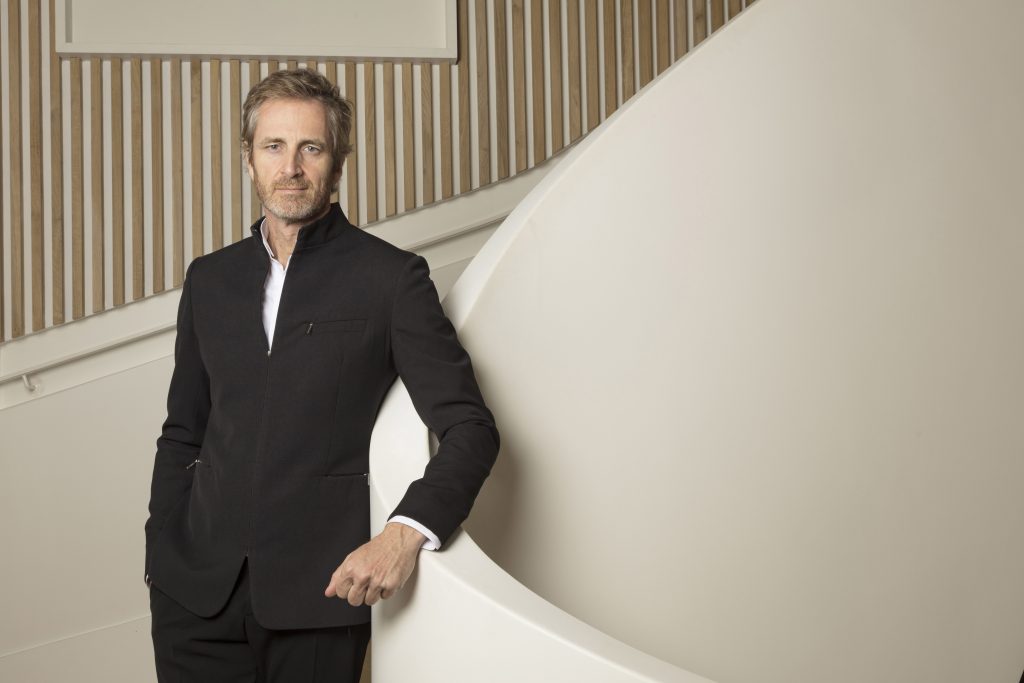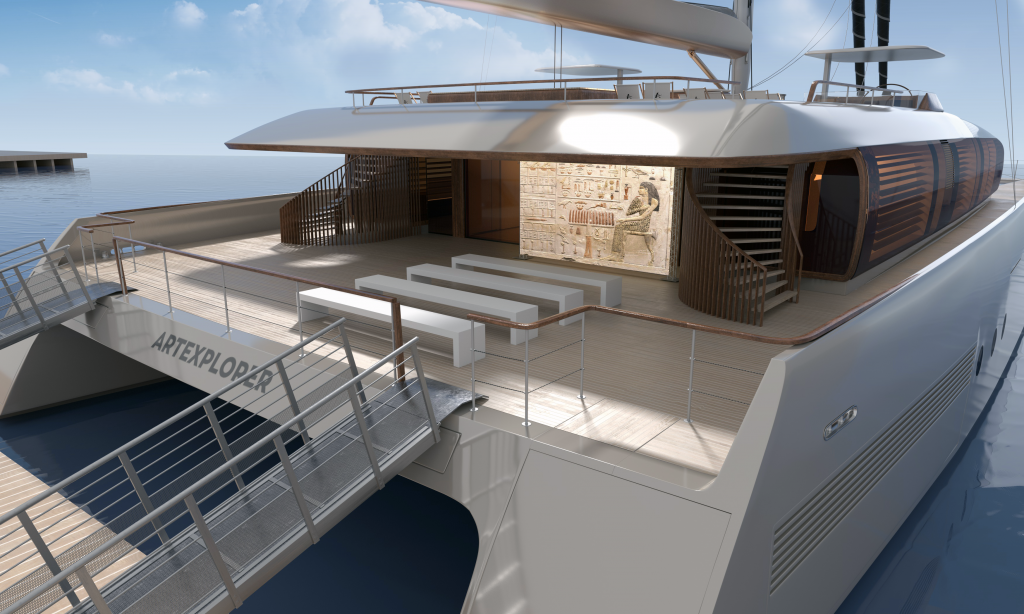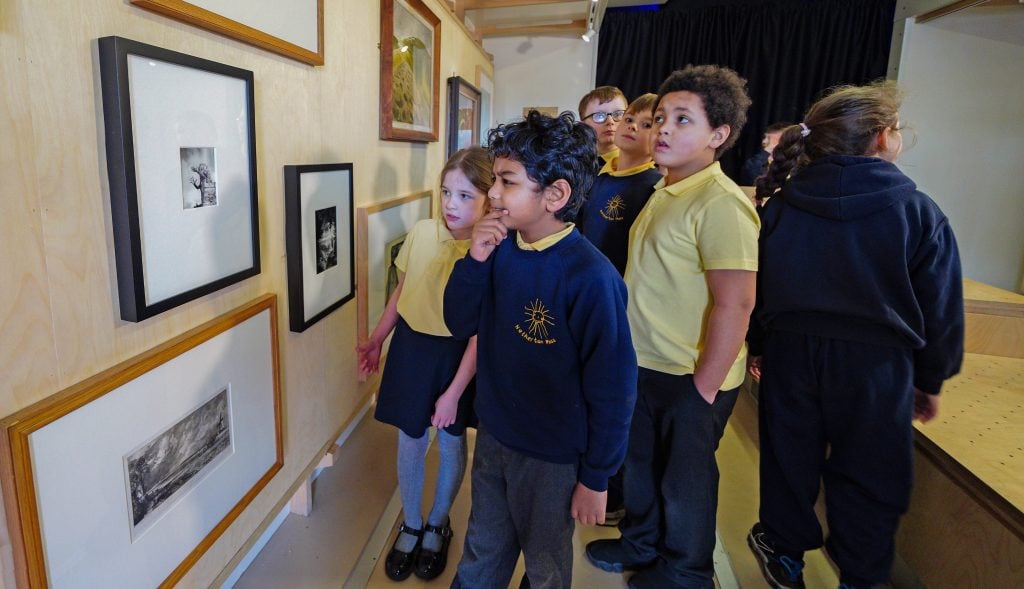People
Meet Frédéric Jousset, the Thrill-Seeking French Millionaire Funding Outlandish Ideas to Make People Fall in Love With Art
Jousset's ideas included building a museum on a boat because "boats fascinate people."

Jousset's ideas included building a museum on a boat because "boats fascinate people."

Devorah Lauter

To the French entrepreneur and arts patron Frédéric Jousset, our most irrational ideas can sometimes be our finest. That thinking has led the 52-year-old thrill-seeker to endurance car racing at 170 mph, to sail across the Atlantic, to climb Mount Everest, dogfight in a French Air Force combat jet, but also—and the reason Artnet News sat down with him—to build a giant museum-boat, deploy a fleet of buses to bring 100,000 kids to the British Museum, and tour museum masterpieces around the country in a truck.
“I wanted to find ways to make art and culture accessible and exciting for the largest number of people, and that’s when I started to have these ideas,” Jousset said, as he hunched over a small table at Café de Flore in Paris. “I saw the same people were the ones who always went to the exhibitions and art fairs. Nobody had really figured out the right formula,” he explained.
Jousset is giving it a try with Art Explora, the international foundation he launched with €4 million ($4.4 million) in 2019. The group works in collaboration with local art associations and institutions to organize and support projects aimed at attracting new audiences to culture, and where no ideas are off the table. Spearheaded from France and London, “we’re not stuck between four walls. Our team moves, creates, and sometimes fights to get things done. They are activists,” added Jousset. With time, he hopes Art Explora, “will be for the world of culture, what Greenpeace is for the environment,” a leading “reference on the question of access to culture,” and a “movement.”

Rendering of the rear deck of the ArtExplorer boat. ©Art Explora.
The arts NGO also offers a prize for innovative programs by European arts organizations working to engage new audiences; a free, online art history course in French and English developed with the Sorbonne University; an artist residency in Montmartre; plus cultural outreach programs in elderly homes and hospitals animated by thousands of volunteers in France and the U.K. This fall, the Artexplorer, a 152-foot-long and 180-foot-tall museum-boat—the largest catamaran in the world, according to its designer, Axel de Beaufort—will sail for Marseille. That’s the first stop on an over 15-country, two-year-long art festival tour around the Mediterranean.
The concept for Art Explora came to Jousset in 2019, after he survived his Everest climb. Once safe at base camp, he had an “awakening,” and decided to relinquish his operational duties at Webhelp, the customer service company he co-founded in 2000, which made him his fortune, listed in 2022 as the 143rd largest in France, worth some €835 million ($915 million). Instead, he would devote his professional time to broadening cultural reach. “I wanted to change my life,” he said. “I had arrived at the end of a cycle.”
In 2020 he seeded a $119 million (€100 million) impact investment fund for arts and culture, called ArtNova, whose profits help support Art Explora. Jousset said he contributes about $7.64 million (€7 million) annually to the foundation. He also owns arts publications, Beaux Arts & Cie and Le Quotidien de l’Art, and has been actively involved in cultural philanthropy since 2005, when he donated $1.09 million (€1 million) to the Louvre. It was a rare feat for a then-35-year-old Parisian, and the museum quickly put him in the spotlight. That led to other leading roles in French art institutions, and Jousset was eventually tasked with piloting the country’s successful Culture Pass program for youth.
“Art played an important role in my life,” in developing creativity, self-confidence, aesthetic judgement, and human relationships, analyzes Jousset, who is also writing a book on the subject. Raised by a father who worked in finance, and a mother who was a curator in the Centre Pompidou’s design department, Jousset remembers how he would visit the museum to see his mom. “It gave me this virus, and I’d like it to be contagious,” he said.
But how best to spread it? There was already no shortage of contemporary art museums, with their regular visitors. “I needed to take side streets, reinvent new cultural proposals around a few strong ideas. And the first thing to remember, is that if people don’t come to you, you have to go to them,” said Jousset.
With emphasis on engagement, participation, and tech innovation, Art Explora hunts for “alternate entry points” to the arts, “because we’ve noticed a lot of people don’t feel comfortable with arts and culture when it is presented in a top-down approach,” Jousset later explained. Their first move was the Art Explora – Académie des beaux arts European Award for cultural projects shaking up the status quo. Winners receive up to $54,600 (€50,000) and have included the Ixelles Museum in Brussels, for their program lending an artwork to neighboring households in a socially diverse area for a few days. More recently, Madrid’s Teatro Real won for their traveling, outdoor opera truck in Spain.
While its programs continue to expand, Art Explora faces challenges. “We’re inventing completely new things that don’t exist. So we have all the problems you have with first attempts,” said Jousset. Obtaining authorization to take national treasures on the road, is one. The process can be particularly hairy in the U.K., where security protocols can be “drastic,” said Jousset. There, his organization partnered with the Tate for their Art Explora Mobile Museum truck, featuring the “Radical Landscapes” exhibition in the Liverpool City region this month.

Art Explora’s Mobile Museum. Photo by Peter Byrne/PA Wire.
“I think we’ve shown that the [museum] truck is safe, that it functions,” said Jousset, who feels confident about its development. The truck operates in collaboration with MuMo, the creator of the French mobile museum truck concept founded in 2011 by Ingrid Brochard. However, conditions on the Artexplorer museum-boat are not suitable for conserving and displaying physical art, so the catamaran will feature a digital exhibition and film done in collaboration with the Louvre. Physical artworks from nearby institutions will be exhibited simultaneously on the adjacent port in a temporary pavilion. “My conviction is that boats fascinate people,” said Jousset, who hopes the massive catamaran works as an “eye-catcher,” for pulling in crowds to the duo, land and sea festival.
At the Café de Flore, while garbage was still piling up around the French capital from striking sanitary workers taking part in on-going protests against raising the retirement age, Jousset spoke in earnest, and was all ears. Dressed down from his signature, black Mandarin collar jacket with invisible zippers that he’d worn the night before to host the packed inauguration of a new cultural space he renovated and now runs, called Hangar Y, southwest of Paris, Jousset presented little of the self-assured, James Bond a la française who “rarely shows an excess of modesty,” per the French media. Le Monde has said the philanthropist “dreams of being the new prince of the French art world.” A claim he adamantly rejects, along with feeling a need to prioritize the French art scene over any other.
“I hope to develop something that is self-standing, and continues after me,” Jousset said of Art Explora. He added that the “secret” to his accomplishments is, “knowing how to surround myself with people who perform, like what they do, and do it well.”
As for talk of favoritism due to his close ties to the French president, Jousset insisted, “these projects are totally unrelated to any kind of political agenda linked to the president. In three years [Macron] won’t be president, but in 30 years Art Explora will still be here.”
More Trending Stories:
Considering a Job in the Art World? Here’s How Much Art Professionals Actually Make for a Living